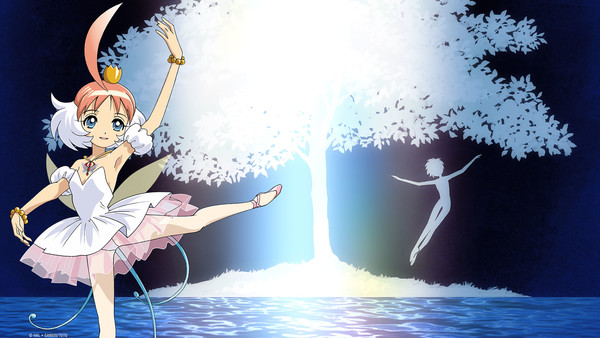The Anime Backlog
Princess Tutu
by Lynzee Loveridge,

Happy holidays Loggers, I hope your celebration preparations aren't stressing you out too much. Everyone has their own traditions, whether it's Black Friday shopping, decorating sugar cookies, hitching up lights on the roof, or, in my case, seeing a seasonal show.
While there are some exceptions (like COVID), every year, I take my mom to see some kind of holiday-themed performance. This has included classics, like The Nutcracker, murder-mysteries centered on Christmas Eve in an old house, to a story about a literary scholar who ends up in a Beauty and the Beast-style relationship with Satan. This year, though, we saw a Ukrainian ballet performance of The Snow Queen. The costumes were beautiful, and the Snow Queen ballerina was breathtaking. Her face was covered in crystals, and a crown that looked like frozen water was secured atop her head.
It was a wonderful evening and a great note to bring Princess Tutu into my life.
Note: This column will routinely include spoilers. Reader discretion is advised.

Princess Tutu
Why Is It Important?
My contemporaries and colleagues love this series, but I'd never set aside time to watch it. Once upon a time, Princess Tutu was firmly in my wheelhouse (for those keeping track, my wheelhouse contains "classic magical girls" and "emotionally-devasting horror"). There are some baseline similarities for my favorite anime series, Sailor Moon, with Ahiru and Usagi both floundering academically and lacking confidence only to be thrust into the spotlight as a girl with a heavy destiny (they're also both named after animals).
There's also a significant cross-over in staff thanks to Junichi Satō. Satō is Tutu's chief director, and he has a long history of working in the girl-oriented anime space. He's best known as the series director for the first two seasons of Sailor Moon, but he's also brought Pretear, Ojamajo Doremi, Kaleido Star, and Aria the Animation to life. More recently, he directed an entry in the anime's biggest magical franchise, Precure, with Hugtto! Precure.
Princess Tutu has all the DNA of a Junichi Satō creation. Its on-the-ground director, Shōgo Kōmoto, is less known, and while he'd go on to direct the magical girl series Fushigiboshi no Futago Hime and its sequel after Tutu, he's mostly worked on storyboards intermittently since. Series writer Michiko Yokote is still as prolific as ever; she's penned scripts for 12 different anime series just this year.
Beyond its pedigree, fans often praise Tutu for his subversive handling of common fantasy tropes, its meta-narrative between the audience and the characters, and its earnest messaging for everyone to decide their own purpose in life.
Does It Live Up to Its Reputation?
Princess Tutu is Revolutionary Girl Utena's kouhai. It doesn't achieve quite the same success as Satō's colleague's emotionally intricate work, but it presents similar theming for a younger palette. Both series exist in conversation with fairytale tropes and the expectation of "what is supposed to happen" and then seek to undermine those same expectations to present a hopeful alternative.
What I struggled with was where the line was for Princess Tutu. There are narrative devices like the ravens or Fakir turning into a tree in one episode that have all the trappings of an allegory but less interiority to pull out the "what." I found myself thinking in circles about whether there was a metaphor to dig into or if the show was engaging in traditional fairytale logic. There are plenty of things in fairytales that "just work like that," and part of the fantasy is accepting it. Cinderella's mother can give her gifts beyond the grave as a tree, a devout girl's tears can cause her severed hands to grow back, and a wolf can disguise itself as a passable grandmother. Fairytales are just like that.
However, Tutu isn't interested in just being a story with magic and a happy ending. If anything, its ending is bittersweet for our heroine, Duck. It is, actually, its ending that I had the most difficulty with despite it also closely aligning with the Utena TV series. I grew to really love and sympathize with Rue and Duck, but I can't say the same for either of the male leads in particular. This is likely due to Mythos spending a good chunk of the series as a cipher, which is entirely understandable given the plot at the time but it did make it more difficult to connect with him as a baseline before his personality becomes conflicted yet again. By the time we head into the finale, I was lukewarm on half of the primary cast. I think this was due to the emotional moments feeling hampered by the animation (despite a character throwing himself out a window and another revealing his parents were murdered). The character designs remind me a bit of Violinist of Hameln, and I generally love the look of the show. This is especially true of the Raven when he begins appearing in the latter half. His impossible large foot stomping down at Rue reminded me a bit of a paper play.
The writing makes an interesting choice to present Duck's "attacks" as not really attacks at all. Duck dances and thus uses art as a medium for conversation and healing. It's a really lovely message, and it warmed me to her as the story progressed. However, in about the third act, she's sidelined for a series of episodes as she doubts herself and her ability to be an effective ally. This is around the same time when Fakir learns he can help undo Drosselmeyer's influence on the town. The last set of episodes meanders a bit as we watch Fakir not write, even after he appears to overcome his associated trauma, and Duck's dance performances fail to connect until the final moment.
Drosselmeyer is himself an intentionally loose thread, but I really wanted some sort of larger confrontation for all the trouble he caused the cast. Still, the story never culminates in meaningful consequences for his ghost. It's probably the combination of this unfulfilled feeling and struggling with its storytelling approach that left me less entranced with Princess Tutu than I hoped.
Watch It or Remove It?
Princess Tutu is still worth your time, especially if you love fairytales. Half the fun can be found in seeing how these classic stories are interpreted within the narrative. Duck is a wonderful heroine who is imperfect but stalwart and genuine. The classical music elevates much of the emotional drama while the story subversions differentiate it Tutu from its magical girl siblings. Just don't go into it expecting an Ikuhara-level of trope-play.
Final Verdict: Yes.
|
Title: Princess Tutu Media Type: TV Series Length: 26 episodes Vintage: 2000 Genres:Fantasy/Magical Girl Availability (U.S.) Streaming: Streaming on HIDIVE in dub-only format. Home Video: Sentai Filmworks released the series on Blu-ray Collector's Edition in 2021, an older Blu-ray set in 2018, and an older DVD set. The series is very easy to find on home video, but I recommend picking up the "remastered and restored" Blu-ray, if you can.
|
discuss this in the forum (10 posts) |
this article has been modified since it was originally posted; see change history